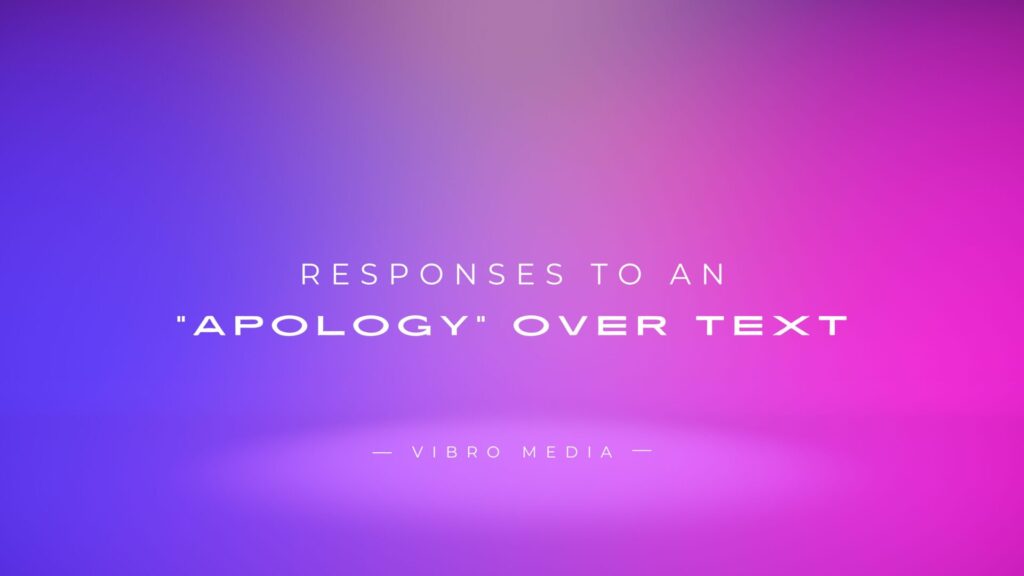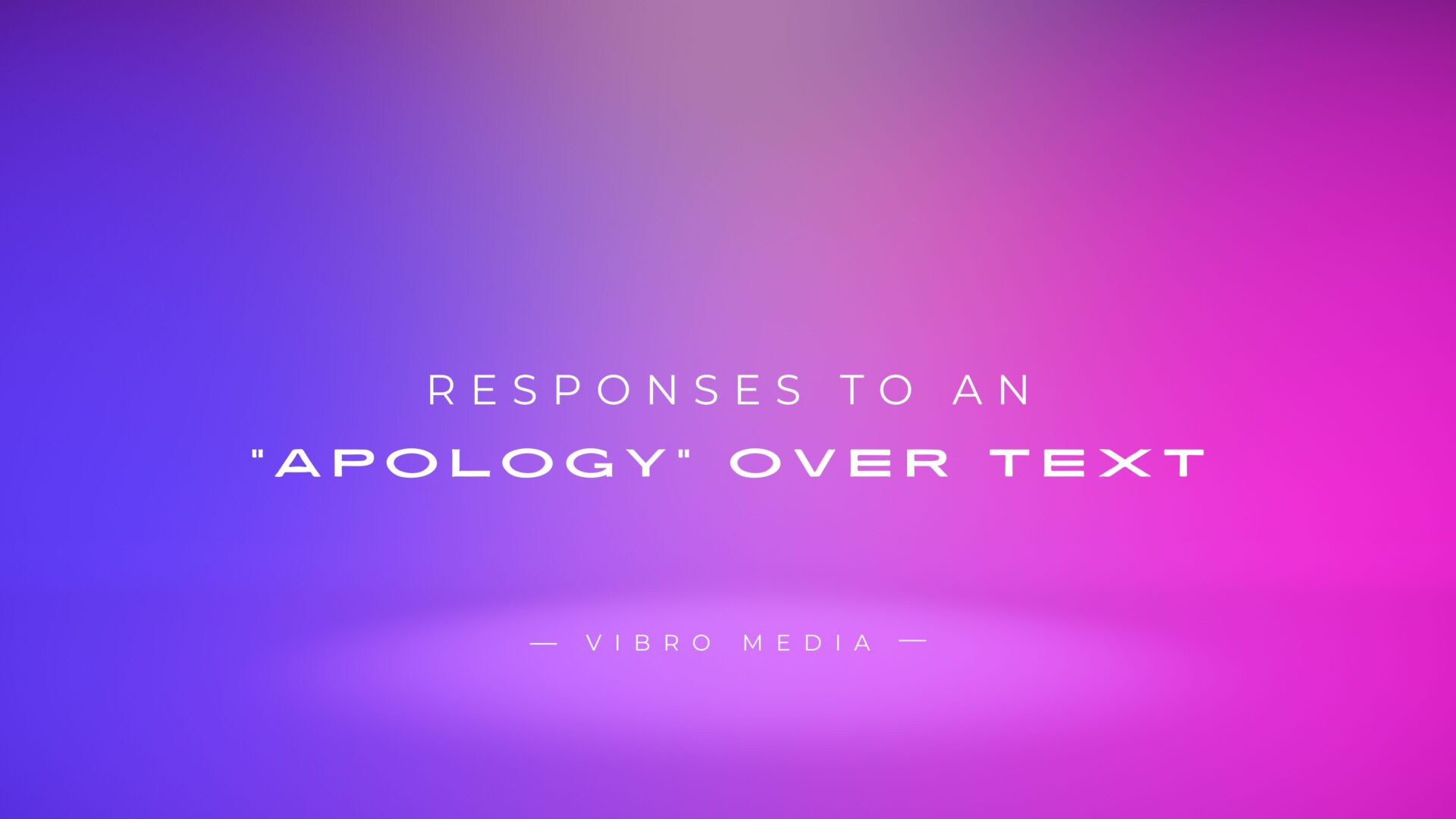In modern times, people have started embracing the practice of saying sorry over a text. Responding thoughtfully for continuity will be necessary if you get an apology from a friend, family member, or colleague. This article gives ideas on providing meaningful replies when apologizing through a text message.
Understanding the Apology Received
You must pause and comprehend the words in a good apology. Go through the letter carefully, try to read between the lines, and understand what it implies.

200+ Responses To An “Apology” Over Text
Acceptance
- Thanks for apologizing. I appreciate it.
- It shows a lot of courage to apologize. Thank you.
- Let’s move on. Everything is alright now.
- I accept your apology. Let us put this behind us.
- We all make mistakes, so an apology is accepted.
- Thank you for saying sorry. It means a great deal to me.
- I value our relationship and accept your apology.
- Don’t worry about it, I understand. Thanks for saying sorry.
- I am grateful that you apologized. Thank you very much.
- No problem. We should not allow this to strain our relationship.
Conditional Acceptance
- Thank you. We have to work on communicating better in future.
- I accept your apology, but can we discuss some ways to avoid this next time?
- I forgive you, but we need to establish some limits.
- Thanks for saying sorry. Let’s make sure it doesn’t happen again.
- I appreciate your apology. Can we talk about how to get better?
- I accept your apology, but I will require time to regain confidence.
- Thank you; please understand that it would take me a while to move past this completely.
- I forgive you, but let’s both strive towards being more self-conscious.
- The apology is accepted, but we need to establish some rules of engagement so that this does not happen again.
- Thanks for the apology; can we agree on some steps to ensure this does not repeat itself?
Acknowledgement Without Full Acceptance
- I hear you. Thanks for the apology.
- I appreciate you reaching out. I need some time to process this.
- Thank you for apologizing. I’m still feeling hurt, though.
- Your apology is noted. I’m not ready to fully accept it yet.
- Thanks for apologizing. I need to think about things.
- I appreciate your message. This is something I need to work through.
- I understand you’re sorry. I don’t know how I feel right now.
- Thank you. I need more time to come to terms with everything.
- I acknowledge your apology. My feelings are still quite raw.
- I see your apology. I’m not quite ready to move on yet.
Seeking Clarification or Discussion
- Thank you for saying sorry. Can we delve deeper into what happened during that time?
- I thank you for apologizing. Shall we talk about it in depth?
- Thanks. Could I have a clearer picture of this issue?
- I appreciate your apology. Can we talk about it?
- Thanks. What can be done to prevent the same in future occurrences?
- I like your message very much. Can you discuss with me what brought us here?
- Thank you. It is not clear why it happened.
- I know you are sorry about it. Can we work on improving our communication skills?
- It was nice of you to apologize. Thanks; inform me when you have free time.
- Thank you for getting back to me. How do we avoid this next time?
Rejection
- I am sorry, but I cannot accept your apology for now.
- I appreciate your apology, but I still feel bad about what happened.
- I’m not prepared to forgive you yet.
- At this moment, I’m afraid I have to disagree with your acceptance of my apologies.
- Thanks for your apologies, but I am unsure whether I am ready to move on.
- However, I need more time to consider it and think about it before accepting your apology.
- I do appreciate your apology, though forgiveness is at bay.
- No stage is suitable to take in your apologies right away.
- It’s too soon for me to say that I forgive you; however, thank you for the attempt.
- You won’t believe this, but no one says they are ready to release guilt.
Expression of Hurt or Disappointment
- Your actions caused me so much pain. I need some time to think about it.
- I am still disenchanted with what happened.
- Although I appreciate your apology, I am still distressed.
- That has hurt me a lot. I need some time alone.
- I’m feeling hurt and need time to get better.
- Currently, I feel deeply disappointed in you.
- Still now, what you did makes my heart break up.
- Right now, it’s difficult for me to forgive you.
- Feeling let down and hurt at the same time
- I am still processing how that made me think.
Gratitude
- I appreciate that you have apologized. Thank you so much for apologizing.
- I am grateful that you reached out and said sorry.
- It means a lot to me; I appreciate your apology.
- Thank you for saying sorry; it is essential.
- Let’s move forward positively; I’m thankful for your apology.
- Thank you for apologizing; it’s a step in the right direction.
- Thank you for acknowledging it; I appreciate your apology.
- Thanks for being honest enough to apologize.
- It shows you care; thank you for the apology.
- I’m grateful to hear that from you. Please apologize.
Indifference or Dismissal
- All right.
- Sure, it’s OK, people say.
- Good, fret not.
- No great shakes.
- Thanks for that.
- Fine and dandy.
- Understood!
- Well, if you insist
- All right then.
- That’s OK.
Humour or Light-Hearted Response
- I accept your apology! Can you also apologize for stealing the last slice of pizza?
- Thank you for apologizing. Let’s trade embarrassing apologies next!
- That’s OK. But don’t develop a habit. Otherwise, I will start charging an acceptable apology!
- It is not a problem; I will let it slide this time. Next time, though, you owe me a hug!
- Thank you for saying sorry. Can I trade this one in for a day off?
- OK, fine! My apology is accepted, but remember to bring cookies next time.
- I forgive you! What shall we do as an adventure as soon as possible to compensate?
- Thanks for the apology! Let’s turn this into something hilarious we can joke about later.
- No worries, I’ll let it go at that. So why don’t we celebrate with ice cream?
- Nevertheless, I accept your apology for making it up to me through karaoke night!
Redirecting Focus
- Apology accepted. How can we prevent this from happening again?
- I accept your apology. What should be done to avoid a re-occurrence of this?
- I appreciate your apology. Let’s concentrate on moving forward.
- Thanks for saying sorry. Now, let’s switch our attention towards positive actions.
- The apology is welcomed. We need to direct our energies towards constructive engagements.
- Don’t worry; let’s focus on what we can do to improve things.
- Thank you for the apology. Now, let’s channel this energy into something constructive.
- Accepted. Let’s move on and concentrate on happier things.
- I forgive you. Let’s redirect our attention to more important matters.
- Thanks for apologizing. Now, let’s direct our efforts towards improving our relationship.
Silence or Non-Response
- No reply.
- Read but no response.
- Deliberate delay in response.
- You are ignoring the message.
- I am choosing not to engage.
- Silence.
- Acknowledged, but no further response.
- I am deciding to take time before replying.
- I am opting for no reaction.
- I am choosing to let the apology sit without an immediate response.
Deflection or Changing the Subject
- Thanks for the apology. Incidentally, have you tasted the food of that new restaurant in town?
- You don’t need to worry about it. Were you able to witness the match yesterday?
- That’s alright. Let’s not dwell on it. How was your day?
- I’ve accepted your apology. Did you finally finish watching that show we were talking about?
- Don’t sweat it. Did you come across this funny meme?
- I’m grateful for your apology, but let’s change lanes and discuss our future.
- Thank you very much for apologizing/having apologized. However, could we move forward and talk about something constructive instead?
- I’ve accepted your apology. You are forgiven for that mistake. For instance, have you been told anything concerning a new work project?
- It is OK, or no worries! How was your weekend?
- No problem! Can we discuss our plans for next weekend instead?
Empathy
- I understand, and I appreciate your apology.
- Thanks for apologizing. I know you didn’t mean to hurt me.
- I hear you. I know this wasn’t easy for you.
- I understand. We all make mistakes.
- I appreciate your apology. I know you feel bad about it.
- I get it. Let’s work through this together.
- I hear what you’re saying. Let’s learn from this.
- I understand. Let’s move forward positively.
- I know you’re sorry. Let’s focus on how to make things better.
- I appreciate your honesty. Let’s find a way to move on.
Minimizing the Incident
- No worries. It’s not a big deal.
- Thank you for apologizing, but it is OK.
- It’s OK. Let’s not think about it.
- Don’t stress about it. It is no biggie.
- I appreciate the apology, but it isn’t required.
- It’s OK. Let us pass through this stage of life.
- No problem. We will concentrate only on the positive things.
- I understand. Let us not make a fuss about it!
- Thank you for saying sorry, but it’s all good with me.
- I accept your apology, but it wasn’t a big deal.
Seeking Assurance
- Thank you for apologizing. Can you reassure me that it won’t happen again?
- I appreciate your apology. Can we work on rebuilding trust?
- Thanks for saying sorry. Please assure me this won’t be repeated.
- I accept your apology. Can you promise to be more mindful in the future?
- Apology accepted. Can you guarantee this won’t happen again?
- I appreciate your apology. Can we agree on how to avoid this in the future?
- Thanks for apologizing. Can you reassure me that this won’t occur again?
- Thank you for apologizing. Can we discuss how to prevent this in the future?
- I accept your apology. Can you commit to making changes?
- Apology accepted. Can we agree on steps to ensure this doesn’t happen again?
Offering Support
- Thank you for apologizing. I’m here for you if you need to talk.
- I appreciate your apology. Let’s work together to make things right.
- Thanks for saying sorry. I’m here to support you moving forward.
- I accept your apology. Let’s move forward together with my support.
- Apology accepted. If you need anything, I’m here for you.
- I appreciate your apology. Let me know how I can support you.
- Thanks for apologizing. I’m here to help you get through this.
- I accept your apology. Let’s move on, knowing I’m here for you.
- Apology accepted. I’m here to help you if you need it.
- Thank you for apologizing. I’m here to help you get through
Setting Boundaries
- I appreciate your saying sorry. I want some space at the moment.
- I accept your apology, but I must set some limits moving forward.
- Thanks for apologizing. Let’s lay down some rules that will prevent it from happening again.
- I appreciate your apology, but I need time to recover.
- Apologies are accepted, but I need to establish a few boundaries.
- Thank you for apologizing. Let’s try to develop better limits for ourselves.
- I accept your apology. What do we need going forward?
- Thanks for apologizing. We have to maintain some boundaries as well.
- I appreciate your apology, but I need to put a shield around my feelings.
- My apology is accepted, but we need to set up some rules.
Comparison
- I understand. I’ve been in your shoes before.
- I appreciate your apology. I’ve made similar mistakes, too.
- Thanks for saying sorry. I’ve been through something similar.
- Apology accepted. I understand where you’re coming from.
- Thank you for apologizing. I’ve made mistakes, too.
- I accept your apology. I know we’ve both been in this situation.
- Thanks for apologizing. I’ve learned from similar experiences.
- I understand. I’ve been in situations like this before.
- Apology accepted. I’ve experienced similar situations.
- Thank you for apologizing. I know what it’s like
Non-committal or Ambiguous Response
- I hear you.
- Let’s take some time.
- It’s noted.
- Thanks.
- I understand.
- OK.
- I appreciate it.
- I’ll think about it.
- We can talk more later.
- Let’s discuss it soon.
Encouraging Open Communication
- Thank you for apologizing. Let’s keep communication open.
- I appreciate your apology. Can we discuss this further?
- Thanks for saying sorry. Let’s talk about this more openly.
- Apology accepted. I value honesty. Let’s talk about it.
- I appreciate your apology. Let’s keep the dialogue going.
- Thank you. It’s good to keep talking about it.
- I appreciate your message. Can we talk more about this?
- Thanks. Let’s talk about this together.
- I appreciate your apology. Let’s discuss this openly.
- Thanks for apologizing. It’s good to keep talking.
Initial Reaction and Emotions
You may feel a lot of different emotions when you receive an apology. You should take a moment to accept your first reaction before responding.
Composing Your Response
To write a meaningful response, consider the apology and recognize its receipt. Think about how you felt when you were apologized to and what it meant for you.
Crafting a Meaningful Reply
When answering, incorporate elements of forgiveness and thankfulness. Show that you are grateful for the apology without losing your self-respect.
Moving Forward
After accepting the apology, release any remaining animosity. Say that you are ready to go ahead and not think about the things that happened in the past.
Expressing Your Feelings
Be straightforward and honest with your feelings about the apology. Tell the person how their apology made you feel and what thoughts are going through your mind now.
Providing Feedback
If it is necessary, use gentle constructive criticism. Use the apology as a platform to improve your connection.
Making Plans
We need to discuss how you both can move forward positively. We must think about the possible future and ensure we never have any misunderstandings again.
Showing Appreciation
I appreciate the expressed remorse and apologize for it. Make it known that their apology deeply hurts you.
Discussing the Situation
Discuss the scenario that necessitated the apology. I can not emphasize enough how important it is to be open and honest with each other concerning any misunderstanding that may occur in future.
Being Honest
Please give me an honest answer, taking the question into account. If you have some doubts about the apology, cautiously express them.
Conclusion
Regarding texts, people’s reactions to apologies can be as diverse as heartfelt acceptance and comic repulsions. However, all of them provide an unusual angle on digital art. Whether you want a sincere or equally humorous response, a healthy mix of respect and humour is necessary. If you want to know more about texting and playful intimacy between individuals in this space, please go through our Sarcastic & Funny Replies To “Okay” Text Messages for some new ideas to make your following exchange enjoyable.
FAQs
Q. Should I respond to every apology I receive?
It is commonly understood that apologizing should be acknowledged and responded to in some form. Doing so conveys deference and gratitude for the bother taken.
Q. How long should I wait before responding to an apology?
It is essential to take as much time as required to consider the apology, but don’t make it a point of tension by keeping it unanswered for too long.
Q. What if I don’t feel ready to accept the apology?
A bit more to think about. Above all, let them know that it wasn’t easy for you, and thank them for being patient.
Q. Is it OK to apologize over text?
Apologizing personally is a better option, but saying sorry through a test is also OK, especially if one cannot manage a face-to-face discussion.
Q. How can I avoid misunderstandings when apologizing via text?
Make sure your apology is sincere and not ambiguous. Please don’t use too much formal language when expressing it because it may be essential to discuss it more.











1 thought on “200+ Responses To An “Apology” Over Text | Best Collection”